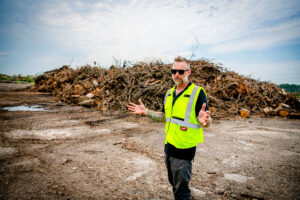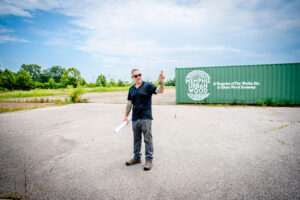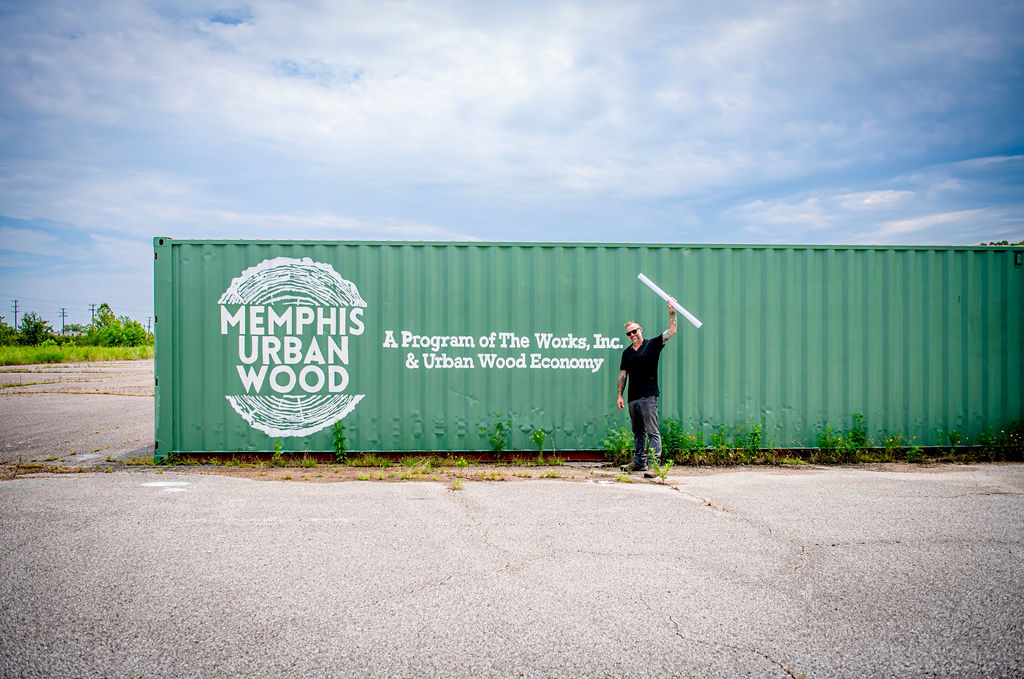Written by Ashley Davis of Kifani Press for Memphis Transformed
A new and innovative pilot program may just put Memphis on the map. This new initiative, led by The Works, Inc. and Urban Wood Economy, prevents downed trees from being landfilled and transforms them into valuable lumber.
Memphis Urban Wood will salvage tons of wood that would otherwise go to overflowing landfills. Clean Memphis sat down with Mike Larrivee, Director of Sustainable Initiatives at The Works, and Jeff Carroll, CEO of Urban Wood Economy, to learn more about their project as part of our ongoing series on circular economies.

Mike Larrivee, Director of Sustainable Initiatives at The Works, Inc. says that Memphis is arguably the hardwood capital of the world.
Take a walk along any of Memphis’ tree-lined streets, and you will see what Larrivee calls a “treasure.” The mild climate in Tennessee is ideal for shade trees such as oaks, maple, poplar, and pecan.
Yet hundreds of downed trees currently go to landfills, everything from 3-foot diameter trunks to leaves or branches.
Shelby County currently landfills over 200,000 tons of municipal solid waste every year, and approximately 6% or 12,250 tons are wood, according to the project.
As those trees rot, they release carbon, a greenhouse gas, back into the atmosphere and contribute to climate change.
Larrivee said that’s an incredible waste of resources.
“We have a treasure that we are really being irresponsible with,” he said.
This summer Larrivee is heading up a new and innovative pilot, Memphis Urban Wood. The city-wide initiative will reclaim wood from trees in communities damaged from storms, disease and other reasons.


The project is a partnership between local community development corporation, The Works, Inc. and national nonprofit organization, Urban Wood Economy.
President and CEO of The Works, Inc. Roshun Austin says that the project directly aligns with their mission.
“This venture is a real-world expression of our motto to rebuild, restore, and renew,” she said.
Austin tapped Larrivee for the project because of his track record in the sustainability sector. He founded the Compost Fairy and spent three years helping communities and businesses recycle food waste.
He says The Memphis Urban Wood Project will provide even greater opportunities to move Memphis towards reducing waste and creating jobs.
“A waste product that can be managed as an asset or a liability – and we choose an asset,” said Larrivee.
“The most important thing to me is job creation in the sustainability sector and maximum impact on the environment,” he added.
The Urban Wood Economy has launched similar programs in cities like Baltimore but the organization believes that Memphis is poised to be a model for the country.
“Memphis has a great opportunity for early success,” said Jeff Carroll, CEO of Urban Wood Economy.
The circular business model takes fallen trees and transforms them into valuable wood products like flooring, bookcases – or even guitars. This generates job creation and builds connections with local tree care companies to saw mills to regional and even national buyers.
“I want the city of Memphis to know that there are ways to do business that are good for the environment, good for people and good for the bottom line,” said Carroll.
Larrivee and Carroll also explained that the project takes the city a step further than sustainability with a “whole tree philosophy.”
“We’re creating value from the entire tree,” Larrivee said. “With a zero-waste facility, we can drive wages up, create more opportunities and expand our impact.”
Ultimately, this business is modeled after the natural cycles in the environment.
“This is a time for us to move beyond sustainability and build systems that are regenerative,” said Carroll. “ We need to take our cue from Mother Nature and ensure we leave no waste. We need to leave things better than we found it.”
Want to learn more about the wood economy or how you can get involved? Visit http://memphisurbanwood.com/



